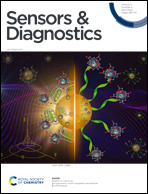Democratizing nucleic acid-based molecular diagnostic tests for infectious diseases at resource-limited settings – from point of care to extreme point of care
Abstract
The recurring instances of infectious disease outbreaks, coupled with complications such as comorbidity challenges and antibiotic resistance, consistently underscore the limitations arising from the absence of diagnostic tests that are both accurate and affordable. There is a pressing need for scalable, accessible, and user-friendly diagnostic solutions that can be deployed effectively in resource-constrained settings. The development of such tests is crucial to address the challenges posed by infectious diseases, providing timely and reliable information to mitigate the impact of outbreaks and enhance public health response strategies. The gold-standard nucleic acid amplification tests (NAATs) are technologically robust but challenged by the requirements of expensive equipment, high-end infrastructure, stringent process-control and expert technicians, all of which are scarce at remote locations. This review provides a treatise on the developments and recent advancements of simplified variants of these tests that carry their promises of being deployable at the grass-root level. Various aspects of technology disruptions, ranging from sample-management, test-protocol and device-design innovations including disease-tracking wearables to the infusion of data-sciences are discussed, and their current restrictions are emphasized. The aspects of covering massive geographical areas and large populations all at once, inclusive aspects accommodating humans and their environment in a connected manner are also brought into perspective. Emphasis is laid on transformational considerations such as innovations to take care of the scarcity of power supply, storage and environmental control, expert personnel, materials supply chain and other inhibitors compounding to strong barriers in accessibility and affordability of the diagnostic test. Finally, it is highlighted that the core technological considerations take care of only one aspect of the intervention, whereas more holistic aspects such as measures of overcoming social barriers, ensuring due protection of individual patient's data (security and privacy) and adhering to ethical norms for clinical trials and validation, connectivity with the livelihood of challenged communities including underprivileged women, interlacing with sustainability issues and employment creation may often turn out to be even more imperative considerations for lab-to-field adaptation. It is envisaged that this inclusive paradigm appears to be the future of infectious disease management, catering the underserved, with no differential treatment of the rich and poor.



 Please wait while we load your content...
Please wait while we load your content...